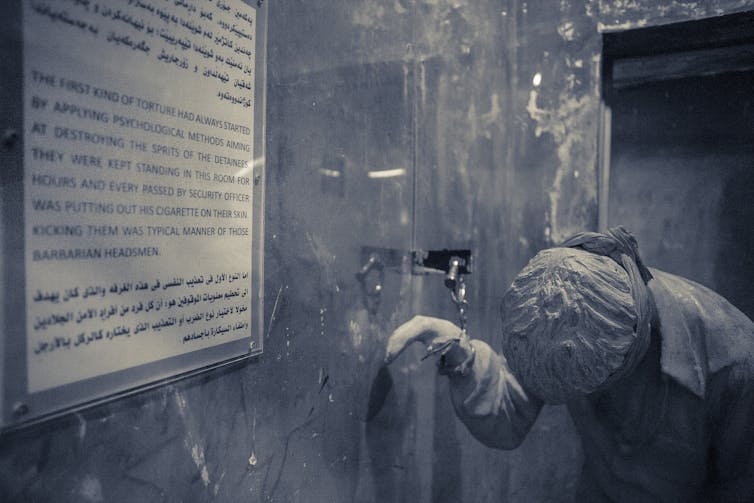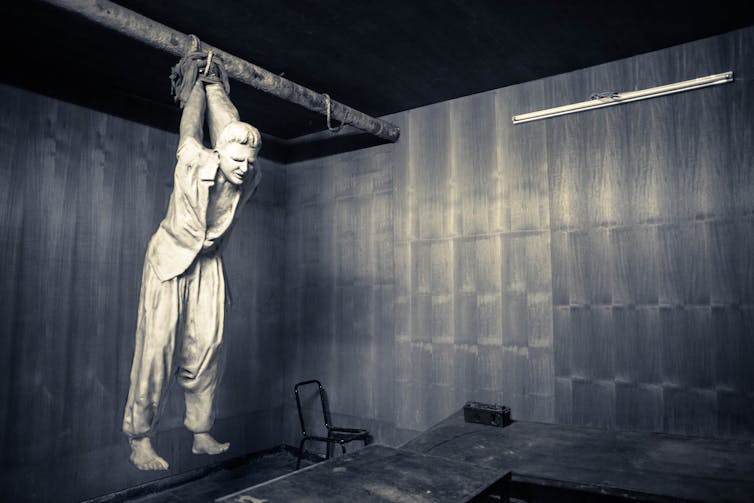How someone becomes a torturer
- Written by Christopher Justin Einolf, Associate Professor of Sociology, Northern Illinois University
Every day, thousands of people are tortured[1] in police stations, security offices and prisons around the world. Human rights organizations protest torture and advocate for survivors, but neither they nor the public knows much about the torturers themselves.
Where do torturers come from? How can they do such terrible things? And most important, is there a way to stop torture by stopping the people who do it?
Answering these questions is difficult because torture, or the infliction of severe mental and physical suffering by government authorities[2], is illegal under international law. Torturers do their work in secret, and few have ever agreed to talk to journalists or researchers.
As part of the Iraq History Project, an oral history project conducted by DePaul University’s Human Rights Law Institute after Saddam Hussein’s fall[3], 14 of Saddam’s former torturers were interviewed about what they did and why they did it[4]. Their stories went into a human rights repository, and I analyzed them as part of a recent research project[5].
While some earlier research found that torturers were psychologically normal people forced to engage in acts against their will, my research shows how recruits voluntarily engaged in torture and how they justified their actions to themselves.
Who becomes a torturer?
Most of the men who were interviewed expressed regret about what they had done. Some of them attributed their choice of careers to traumatic childhoods where they endured violence from abusive, alcoholic fathers.
One explained that he hated his father so much and “had a strong desire to take revenge on him.” In search of something that “made me of value and position,” he applied for a job with the security forces. When his application was accepted, he welcomed the “happy news,” as he “was going to have power over people like my dominant father.”
How are they recruited?
All of the torturers in the study joined Saddam’s security forces of their own free will, sometimes using family connections or paying bribes to get the prestigious and well-paid job of security officer.
They thought they would become investigators, tasked with the job of finding and arresting enemies of the state. They were shocked when they were assigned the job of torturer, where they would have to torture dissidents while interrogating them and force them to confess to political crimes.
Unable to ask for a transfer, the recruits faced a stark choice: lose their job or become a torturer. Many who stayed did so because they were poor and needed the money. One recalled telling his mother that he had gotten a great job with the security forces and assured her that he would take care of her and she would no longer have to live in poverty.
When he found out he was assigned the job of torturer, he said he “was not able to say anything because of my fear of losing the job, and because of my fear of going back to my mother and disappointing her after all the promises I had made.”
 A figure of a person handcuffed to a wall demonstrates that many torture victims were forced to stand for long periods of time.
Hélène Veilleux, CC BY-NC-SA[6][7]
A figure of a person handcuffed to a wall demonstrates that many torture victims were forced to stand for long periods of time.
Hélène Veilleux, CC BY-NC-SA[6][7]
How are they trained?
Novice torturers received practical instruction in how to torture, sometimes in classrooms and always on the job under the supervision of experienced torturers. They learned how to most effectively cause pain by beating people with cables, using electric shock, beating the soles of the feet and suspending victims by their arms from the ceiling.
Recruits were urged to do away with their natural feelings of empathy and compassion. One recruit recalled being told he had to be “a destroying monster,” “tough-hearted” and “having no mercy for others,” and he had to stop being “a human being with a heart of friendliness or mercy.” Another was told “never to show any mercy to those who would want to harm the country or the President Saddam Hussein, who was like the father of our house.”
How are they supervised?
The Iraqi torturers worked under orders and were sometimes ordered to do specific acts of torture. Their superiors placed security cameras in the torture rooms to make sure they obeyed. Two of the torturers say they suffered torture themselves when they refused to harm a victim.
When they did their jobs well, they were rewarded with praise and promotions. After getting one important prisoner to confess, one recalled, “all the officers were proud of me for my satisfactory performance, and all my colleagues at the directorate started to regard me as an important person.”
 Another museum exhibit shows a different form of torture: being suspended by the arms.
Hélène Veilleux/Flickr, CC BY-NC-SA[8][9]
Another museum exhibit shows a different form of torture: being suspended by the arms.
Hélène Veilleux/Flickr, CC BY-NC-SA[8][9]
How do they justify their actions?
Torturers convinced themselves that they were saving the country and that their victims deserved what they got. After his first day of training, one asked a colleague, “What sins did those persons who were tortured in front of me commit?”
The colleague answered: “Their sins are huge and cannot be forgiven! Their sins are that they want to topple the regime, disturbing our government and dispersing chaos, terrorism, looting and killing. Don’t you ever believe that any one of those is a victim! We are the victims of them.”
The recruit “spent that night thinking of how I would be able to hold the cable and beat those people with it. … However, I remembered his words and that those people were just traitors and criminals, and I thought to myself, ‘Yes! They deserve all that torture, as they are trying to betray the country, and so they have to get what they deserve!’”
How can torture be prevented?
Studying torturers is strange and disturbing, and understanding their actions may seem like excusing them. But studying torturers is important: Only by understanding how and why they do it can people begin to prevent torture. Like a doctor who studies cancer in order to cure it, social scientists must study torture in order to help human rights groups and governments prevent it.
[Over 110,000 readers rely on The Conversation’s newsletter to understand the world. Sign up today[10].]
References
- ^ thousands of people are tortured (www.amnesty.org)
- ^ infliction of severe mental and physical suffering by government authorities (www.ohchr.org)
- ^ oral history project conducted by DePaul University’s Human Rights Law Institute after Saddam Hussein’s fall (law.depaul.edu)
- ^ 14 of Saddam’s former torturers were interviewed about what they did and why they did it (doi.org)
- ^ recent research project (doi.org)
- ^ Hélène Veilleux (ladentdeloeil.net)
- ^ CC BY-NC-SA (creativecommons.org)
- ^ Hélène Veilleux/Flickr (www.flickr.com)
- ^ CC BY-NC-SA (creativecommons.org)
- ^ Sign up today (theconversation.com)
Authors: Christopher Justin Einolf, Associate Professor of Sociology, Northern Illinois University
Read more https://theconversation.com/how-someone-becomes-a-torturer-167027

